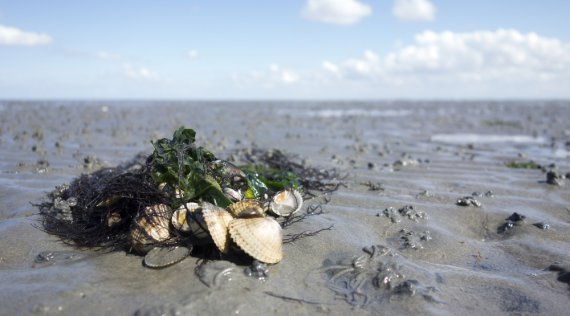© Shutterstock
‘Thirty percent fewer animals in the North Sea’ – this is the heading of the Dutch news release by Statistics Netherlands (CBS). Trawling is pointed out as the main culprit. This was elaborated on in the Living Planet report that the CBS compiled in collaboration with the World Wide Fund for Nature (WWF). This report also used data made available by Wageningen Marine Research. ‘This conclusion cannot be drawn based on those data’, says Ingrid Tulp, researcher at Wageningen Marine Research.
No causality
Tulp is highly surprised by this interpretation. ‘It is bizarre to see how easily causes are connected to these trends. The data are only collected for the monitoring of various species, to study how the populations develop. Data of fish, for example, is used to advise on a prudent level of fishing. We have performed only very limited research of the reasons for these trends. The CBS and WWF draw conclusions without having carried out any proper research.’
According to Tulp, the calculations are correct in themselves. ‘It is fine to make this kind of overview reports.’ They looked at numbers of species, with every species having the same weighing – whether it is rare or not. ‘But they subsequently combined the trends of more than 100 bird, fish and seabed dwelling species. This is very simplistic from a biological point of view. At least, if your next step is connecting this trend to a single cause. The report contains several horizontal ‘flat’ trends, for such locations as the Wadden Sea and the coastal areas. This is nothing less than logical, as some species improve, while others decline. The average remains constant.’
What mostly bothers Tulp and her colleagues is the fact the news release title suggests that the number of seabed dwellers has diminished. ‘This is incorrect, as they only present indexed trends. One cannot write that one species has increased in numbers by 20 percent and another one has declined by 60 percent and subsequently present this as a total average, as the total number of animals is unrelated. That number could have increased, decreased or remained the same.’
It seems like the authors of the report arbitrarily designated a cause.
Ingrid Tulp, researcher at Wageningen Marine Research
The supposed decline is blamed on trawling, which Tulp finds remarkable. ‘We do not doubt it has an influence on life on the seabed, but trawling has decreased over the investigated period. It seems like the authors of the report arbitrarily designated a cause. Many more factors have changed within the system, such as fishery, beach nourishment and water temperature. The conclusions of the CBS and WWF aren’t based on statistical analyses in which they would have tried to link the trends to factors that would explain them. That would have been very hard, as all factors changed heavily over the period investigated. For example, temperatures have risen and beach nourishment has increased.’
Monitoring
Furthermore, specific seabed dwellers such as crustaceans, molluscs and sea urchins are among the species that are reported to have had a decline in numbers. According to Tulp, those are exactly the species one would expect to recover upon a decrease of trawling activities. ‘To monitor the seabed dwellers in the North Sea, data was used from the Monitoring Waterstaatkundige Toestand des Lands (“Monitoring of the National Water State”) that was performed by Rijkswaterstaat. The method used is very suitable for small and numerous species. However, crustaceans and molluscs are not species that you can properly count using this method.’ This means the question factually remains whether the population is recovering or declining – as the report suggests.
Barely involved
According to Tulp, the researchers of Wageningen Marine Research were barely involved in the report. ‘They have asked us – and several other organisations – whether they could use our data. This was possible, of course, as everything is publicly available. During a workshop, we were asked to indicate the trends presented by the CBS and point out possible causes. We explained that this was not possible based on the current limited knowledge; that it would require much more profound research, in which one would try to unravel the cause of specific population fluctuations for each species or group of species.’
Wageningen Marine Research intends to enter discussions with the CBS and WWF on the subject. It is yet unclear as to when this will take place.

